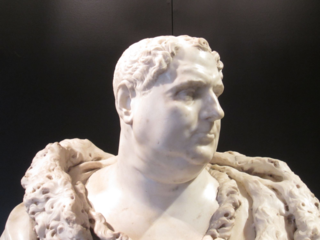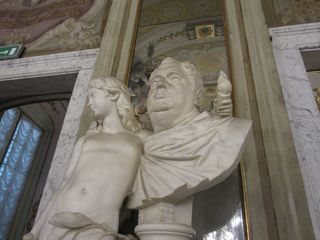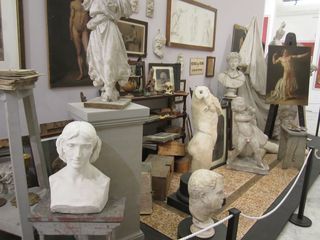Vitellii in Genoa
I was idly googling a couple of weeks ago, in that late night kind of way -- when, searching for the emperor Vitellius, I came across a notice about a "single object" show in Genoa, featuring a splendid things my emperors seventeenth version of a portrait of that short-lived, rather disreputable Roman ruler (of course, that reputation is very largely to do with the fact that he was a losing claimant in the civil war of 69 CE, and it was in the interests of the winners, 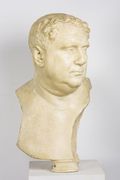 Vespasian and co, to blacken him). The statue looked tremendous, and obviously based on the so called "Grimani Vitellius" in Venice (on the right) -- an ancient portrait statue, once believed to represent Vitellius, though it's almost certainly not him. (That's one of the things that my emperors' project is interested in... how particular "faces" get strongly associated with particular rulers, even though they actually have nothing to do with them at all.)
Vespasian and co, to blacken him). The statue looked tremendous, and obviously based on the so called "Grimani Vitellius" in Venice (on the right) -- an ancient portrait statue, once believed to represent Vitellius, though it's almost certainly not him. (That's one of the things that my emperors' project is interested in... how particular "faces" get strongly associated with particular rulers, even though they actually have nothing to do with them at all.)
Anyway, the show -- in the Royal Palace Museum (Palazzo Reale) -- was only on till the end of February, so I thought I had to get over to see it. I really hit lucky. For a start, it proved to be a tremendous piece, probably by the sculptor Filippo Parodi, and well worth the schlepp. Secondly I happened to bump into one of the curators, who knew a lot about the piece and we had a great chat (she had been at the main entrance and rightly inferred that someone who comes into a museum and specially asks for "il ritratto di Vitellio" is there on a mission. And thirdly, there were some more Vitellii to be found,
One I came across by accident in the amazing Gallery of the Mirrors in the Palace. This proved to be an over the top but also rather jokey kind of place. One rather obvious joke must be this panel (below right) of a little Cupid labelled "Crapula" (which means "hangover"). But what about the Vitellius at the top being strangely 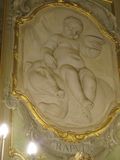 embraced by some kind of Cupid (?), not how his is usually depicted at all. I still haven't the foggiest clue what is going on here, but the helpful curator with whom I discussed it, said that the portrait of Vitellius here was related from another Vitellius in town, the so-called "Vitellio Durazzo". This was once thought to be a Roman original (and was much admired by early tourists) but is now generally thought to be another seventeenth century version of the "Grimani Vitellius" in Venice. (That's a further linking theme in what I am doing: more often than you would imagine it is hard to tell ancient from modern images of emperors.) The Durazzo, she explained, was now in the Museo of the Accademia Ligustica di Belle Arti, not far away. So I went over to have a look.
embraced by some kind of Cupid (?), not how his is usually depicted at all. I still haven't the foggiest clue what is going on here, but the helpful curator with whom I discussed it, said that the portrait of Vitellius here was related from another Vitellius in town, the so-called "Vitellio Durazzo". This was once thought to be a Roman original (and was much admired by early tourists) but is now generally thought to be another seventeenth century version of the "Grimani Vitellius" in Venice. (That's a further linking theme in what I am doing: more often than you would imagine it is hard to tell ancient from modern images of emperors.) The Durazzo, she explained, was now in the Museo of the Accademia Ligustica di Belle Arti, not far away. So I went over to have a look.
 At first I couldnt find the damn thing. There were lots of great paintings, and a nice group of plaster casts, but no sign of an emperor (and it didnt ring a bell either with the nice and chatty lady who was the custodian). Eventually I found it (left), on the floor in what was -- as you can see -- close to a mock up diorama of early artistic practice (below).
At first I couldnt find the damn thing. There were lots of great paintings, and a nice group of plaster casts, but no sign of an emperor (and it didnt ring a bell either with the nice and chatty lady who was the custodian). Eventually I found it (left), on the floor in what was -- as you can see -- close to a mock up diorama of early artistic practice (below).
I havent begun to process all this, but one thing's for sure: this very briefly ruling emperor is going to have a bigger part in my book.
Mary Beard's Blog
- Mary Beard's profile
- 4110 followers


